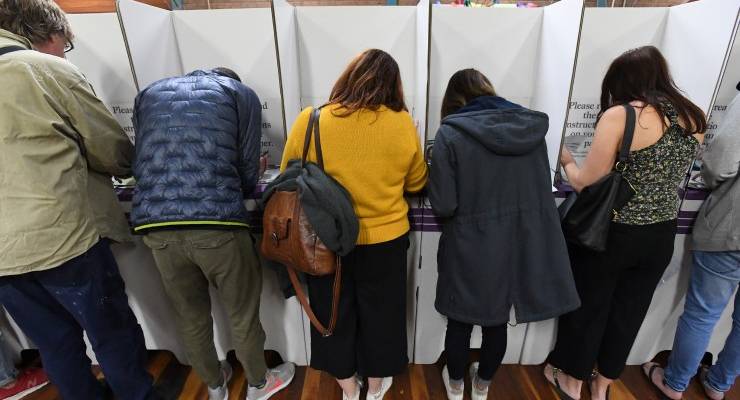
Because Scott Morrison is yet to declare a date for the election, we don’t know when Australians will head to the polls. But what we do know is that it will be an election like no other.
Whether it is called for March or May (the latter more likely at this stage), the Australian Electoral Commission is bracing itself for a mammoth task as it pulls off its first national election in the midst of a pandemic.
With the close result expected, and predictions of a narrow victory or minority government swirling, the number of pre-poll votes, particularly postal, means there will be a “higher danger” of not having a result on election night, the AEC tells Crikey.
But the issue is more complicated than that. The reality of a pandemic election is that everything will be slightly drawn out, from pre-polling and queues at polling booths to the result itself.
So is the nation ready to vote? And what will a pandemic election look like?
What we can expect
Pre-poll
Voters shouldn’t be surprised if the uptake of postal votes means we’re left waiting a little longer to find out the winner.
“Rates of early votes and postal votes rise during pandemic elections. How much we don’t know, but it will depend on the COVID situation at election time,” the AEC said. “With [fewer] votes in on election day, the number of seats still in question on election night likely goes up.”
The AEC’s task on election night is to report enough data for analysts and the media to confidently make calls, and lead to enough information to confirm who will form government. But with postal votes coming in past election day, and fewer votes cast on the day, that will cause it headaches.
Election day
As for logistics on the day, with various COVID protocols in place — including social distancing and regular cleaning — expect long queues and a slower process. The AEC expects to have 100,000 staff running the election, about 10,000 more than previous elections. This increase is largely to address processing and COVID demands, but also to continue the count beyond election day where necessary.
Online voting
Online voting akin to what has been used by the NSW Electoral Commission is off the table for now. Federal electoral laws would need to change to allow for such a system, and the government hasn’t indicated any such plans. The iVote system used in the Sydney council elections was riddled with problems, and its lack of integrity is prompting potential delays in the NSW byelections.
Is the government ready?
In December laws were passed to ensure the election could take place amid an emergency declaration and allow for modifications such as additional time for pre-polling and expanded reasons for voters to apply for a postal vote.
When Crikey asked how prepared the government was for a pandemic election, Assistant Minister for Electoral Matters Ben Morton referred to the amendments but did not comment on what the government has done to ensure a smooth election.
Labor’s Senator Don Farrell told Crikey that although the AEC would deliver an election professionally as always, conducting an election “efficiently and safely will be much more challenging because of Scott Morrison’s repeated failings”.








Looking forward to the result of the next federal election.
But with postal votes set to increase, will we see Trump tactics from the team Australia knows is going to lose?
At least I have faith in the AEC.
The memory is ‘TRUMP’ and the reality . . . is ‘Trump Lite’.
Beat me to it. One would suggest we are at risk of conspiracy idiots, organised or otherwise including some MPs, who we have observed encouraging legal, physical and intimidatory disruptions against Covid measures e.g. ‘Freedom Protests’ and will no doubt try import the well practised GOP/Koch election conspiracies, on our own elections.
Quite sad and concerning how formerly conservative parties are now of the hard right including confected libertarian conspiracies, ‘using’ another one i.e. ‘Christianity’ and authoritarianism.
Our problem is not with the official management of the counting of the votes . The current problem is the capacity of one person with $ 100 million to spend to gain 1 or 2 votes in 100 to generate sufficient preference votes to create a miracle. .What does $100 million entitle you to post election
Helpful legislation, taxpayer funded port, rail & road facilities and a the year tax/royalty holiday.
oops. “…and a TEN year tax/royalty holiday.“
“It not who votes that counts but who counts the votes.”
We had easy access to both postal and early voting here in the west for our state election in March last year. Worked out alright.
Ditto in Queensland in 2020, no problem whatsoever. And, happily, with the correct result.
The AEC relies on many temporary and casual workers for polling day and to make preparations in the months before a Federal election. If the current shortage of workers persists due to Covid 19 related issues the impact on the election could be significant . A ‘competent’ Federal Government would have a comprehensive plan to address this looming issue. Hopefully the government has learnt something and won’t be suggesting getting 15 year old children to drive forklifts to distribute the polling papers from warehouses.
Is the government ready?
What a ludicrous question.
Tto which we all no the answer.
DOH.
I’ve voted on-line twice in federal elections from overseas without any problem, once from a country with barely extant Internet, far from its capital and no-one is less tek-lit than I.
Pity that it can’t be the norm, in country.